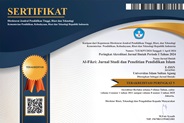URGENSI PENDIDIKAN SIFAT MALU DALAM HADITS (Telaah Hadits Imran Ibn Husain tentang Sifat Malu dalam Kitab Musnad Ahmad Ibn Hanbal)
Abstract
In the hadith of the Prophet explained one of the attributes called the term al-haya '. The nature of al-haya ’is translated in Indonesian with the meaning of shame. Most people assume the nature of shame is a bad trait that should be kept away from someone's personal. But the shame is actually recommended by the Prophet because it is a good quality as stipulated in the hadith of Imran Ibn Husain, narrated by Ahmad Ibn Hanbal. This study aims to provide an explanation of the nature of shame mentioned by the Prophet as one of the good qualities. The conclusion of this study is the answer for people who still have the notion that shame is a bad trait that must be abandoned. The nature of shame is very urgent in Islamic education that should be fostered by all Muslims. That is due to the nature of shame can contribute to education, among others: 1) Education in shame can foster human ability to maintain the mind; 2) Keeping away actions that consume things that are prohibited; 3) Always remember death; 4) Become a person who is zuhud; 5) Contribute to the education of faith; 6) Education to decorate and beautify yourself with commendable qualities namely shame; 7) Human education to achieve the love of Allah.
Â
Keywords: Hadith, Prophet, Imran, Embarrassed, Education
Full Text:
PDFReferences
Al-Andalusi, Abu Hayyan Muhammad Ibn Yusuf Ibn Hayyan Asir ad-Din, 1420H, al-Bahr al-Muhit, Beirut: Dar al-Fikr
Al-Asqalani, Ahmad Ibn Ali Ibn Hajar, t.th, Fath al-Bari Syarh Sahih al-Bukhari, (Beirut:Dar al-Ma’rifah, t.th).
Al-Bukhari, Muhammad Ibn Ismail, 1422 H, Sahih al-Bukhari, Damaskus: Turuq an-Najah
Al-Fairuz Abadi, Majd ad-Din Abu Tahir Muhammad Ibn Ya’kub, 1426H, al-Qamus al-Muhit, Beirut: Muassah ar-Risalah
Al-Hanbali, Abu Hafs Siraj ad-Din Umar Ibn Ali Ibn Adil, 1419H, al-Lubab fi Ulum al-Kitab, Beirut: Dar al-Kutub al-Ilmiyyah
Al-Jauziyyah, Muhammad Ibn Abu Bakar Ibn Sa’d Syams ad-Din Ibn Qayyim, 1416 H, Madarij as-Salikin baina Manazil Iyyaka Na’budu wa Iyyaka Nastain, Beirut: Dar al-Kitab al-Arabi
Al-Maqdisi, Najm ad-Din Abu al-Abbas Ahmad Ibn Abdurrahman, 1398H, Mukhtasar Minhaj al-Qaidin, Damaskus: Makatabah Dar al-Bayan
Al-Muqaddam, Muhammad Ibn Ismail, 1436 H, Fiqh al-Haya, Mesir: al-Amal
Al-Qazwini, Ibn Majah Abu Abdillah Ibn Muhammad Ibn Yazid, t.th, Sunan Ibn Majah, Beirut: Dar Ihya al-Kutub al-Arabi
Al-Qusyairi, Muslim Ibn al-Hajjaj, t. th, Sahih Muslim, Beirut: Ihya Turas al-Arabi
An-Nawawi, Abu Zakarya Yahya Ibn Syaraf, 1415H, al-Minhaj Syarh Sahih Muslim Ibn al-Hajjaj, Beirut: Dar al-Ma’rifah
Asy-Syafi’i, Muhammad Ali Ibn Muhammad al-Bakri, 1425H, Dalil al-falihin li Turuq Riyad as-Salihin, Beirut: Dar al-Ma’rifah
At-Tirmidzi, Muhammad Ibn Isa Ibn Saurah, 1998, Sunan at-Tirmizi, Beirut:Dar al-Garb al-Islami
At-Tirmidzi, Muhammad Ibn Isa Ibn Saurah, 1998, Sunan at-Tirmizi, Beirut: Dar al-Garb al-Islami
Az-Zamil, Abd al-Muhsin Ibn Abdullah, t.th, Syarh Hadits Syu’ab al-Iman, https://www.alukah.net/web/.diakses 12 Agustus 2019.
Ermayani, Tri, 2017, LGBT dalam Prespektif Islam, Jurnal Humnika, Th XXVII, No. 1September 2017 (https://www.reasearchgate.net) diakses 16 Juli 2019
Ibn Al-Asyas, Abu Dawud Sulaiman, t.th, Sunan Abu Dawud, Beirut:al-Maktabah al-Asriyyah
Ibn Hanbal, Ahmad, 2001, al-Musnad, Beirut:Muassah ar-Risalah
Sumsel Tribun News.com, diakses 16 juli 2019.
DOI: https://dx.doi.org/10.30659/jspi.v2i2.5153
Refbacks
- There are currently no refbacks.
Al-Fikri is published by the Department of Islamic Religious Education, Faculty of Islamic Studies, Universitas Islam Sultan Agung, Semarang, Indonesia.

This work is licensed under a Creative Commons Attribution 4.0 International License








